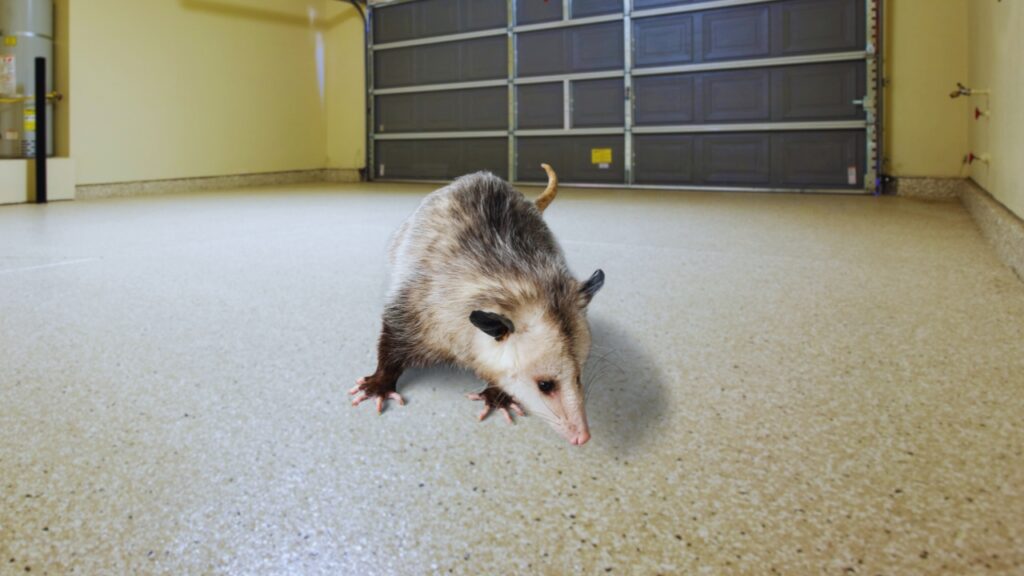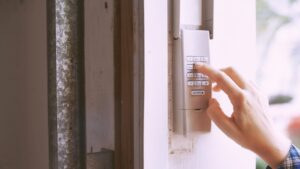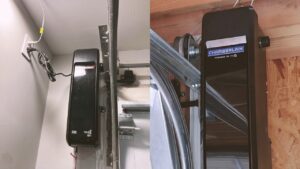Connect With A Garage Expert
Connect with local experts, Compare quotes, Get the best price.
Finding a possum in your garage can be an unpleasant surprise. These wild animals are often regarded as pests that can damage property and spread disease. Even as you’re figuring out how to get a possum out of your garage, remember that it probably entered unintentionally. It is likely more frightened by the encounter than you are!
The good news is that there are many clever techniques to encourage possums to leave garages and retreat to the safety of their dens. In most cases, given the proper prompting, the frightened possum will voluntarily exit and be on its way.
By thoughtfully implementing these non-lethal control strategies, homeowners can humanely get possums out of garages. This article will explore gentle but effective methods to coax the possum out of the garage without endangering pets, children, or the possum itself.
What are Possums? How Did They Get Into My Garage?
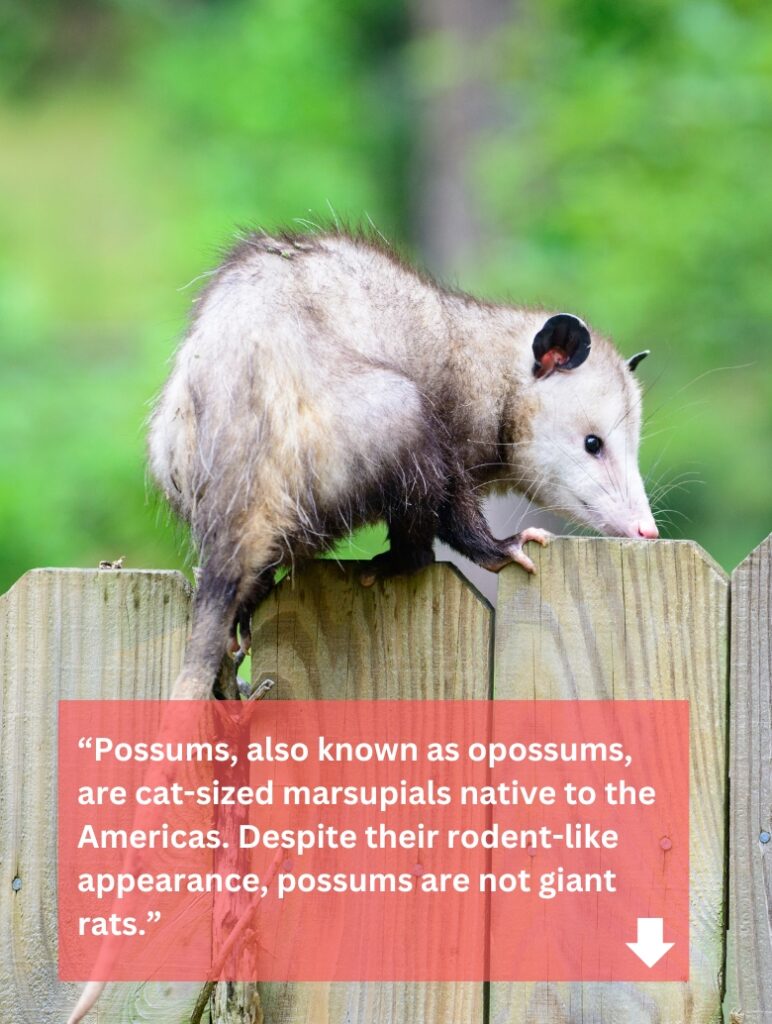
Possums, also known as opossums, are cat-sized marsupials native to the Americas. Despite their rodent-like appearance, possums are not giant rats. They have distinct white or gray fur, pink ears, and long tails, and they can grow up to 20 inches long. You’ve likely spotted their eyes glowing at night, as they are nocturnal creatures.
Possums frequently wander into garages when searching for food and shelter and can cause potential risks and damages such as:
Structural Damage
- Possums have sharp teeth and claws that can chew through wood infrastructure, insulation, doors, and even asphalt shingles.
- They may gnaw on electrical wiring or plumbing materials, creating dangerous hazards in the garage.
- Their climbing and burrowing habits can undermine structural stability if left unchecked.
Health Risks
- Possum droppings can spread over 60 types of diseases through bacteria, parasites, and toxins if allowed to accumulate. Diseases include leptospirosis, tuberculosis, spotted fever, and more.
- Ticks and fleas that live on possums may also come off in the garage and bite homeowners or pets, transmitting Lyme disease, Rocky Mountain spotted fever, and typhus.
Attract Other Pests
Possum nesting materials, waste, and carcasses attract rats to your garage, which poses risks of infecting stored items and food with bacteria like Salmonella and E. Coli.
Furthermore, This environment also becomes a breeding ground for bugs in the garage, as these pests are drawn to the same conditions that support rat populations. They can decimate gardens outside the garage and spread parasites through produce.
Consequently, the presence of rats can indirectly lead to an increase in various bugs, exacerbating the pest problem. Flies and cockroaches congregating on possum droppings may swarm inside the house, further underlining the importance of addressing these issues comprehensively.
Signs of a Possum in the Garage
Have you ever walked into your garage and felt like something was off? Maybe there was a strange smell, or some items seemed disturbed. These could be telltale signs of an unwelcome possum visitor. Look for these signs:
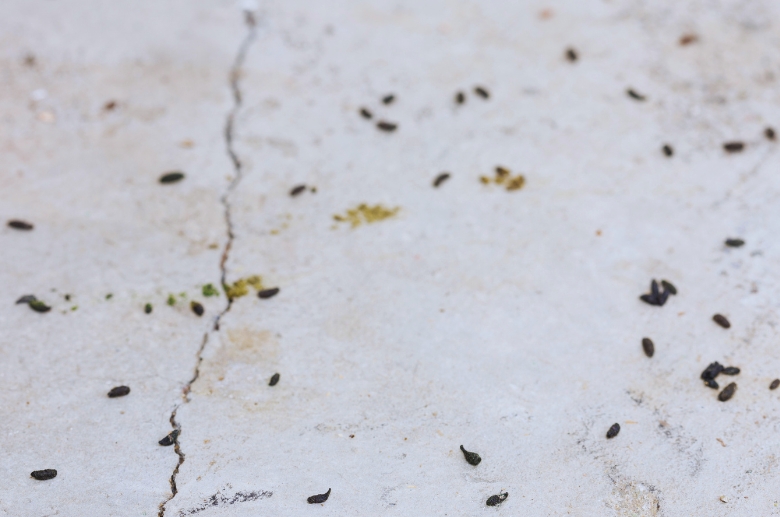
- Droppings – Possum droppings look similar to dog feces and will be found in corners, attics, and crawl spaces. They carry bacteria, parasites, and diseases.
- Nocturnal noises – Possums are nocturnal and make rustling, hissing, growling, or screeching sounds at night as they move through the garage. You may hear them walking across the roof as well.
- Unpleasant odors – Due to their droppings and urine markings, possums give off a foul, musty odor. The scent is stronger during mating season.
- Damage to bins and food containers – Possums will rip into any container holding food meant for humans or pets. You’ll find trash strewn across the garage floor and bite marks on plastic bins.
- Nesting materials – Possums build nests made of leaves, twigs, insulation, and shreds of fabrics stolen from the garage. The nests are spherical, around 2 feet wide, and used to house their young.
How to Get a Possum Out of Your Garage in 6 Simple Methods
Before implementing possum removal methods, remember that trapped wild animals are frightened and may bite or scratch in self-defense. Consider calling professional wildlife control operators if you are uncomfortable with the risks of DIY removal. They have protective equipment, licenses to handle possums, and experience ensuring humane treatment.
Also, please be reminded that possums are classified as protected native wildlife in certain states, with laws prohibiting trapping or relocating them. Check your state and local statutes before taking any action to remove a possum. You may be required to obtain permits, inspect traps daily, or release a captured possum onsite.
Contact Authorities About Trapping Wildlife
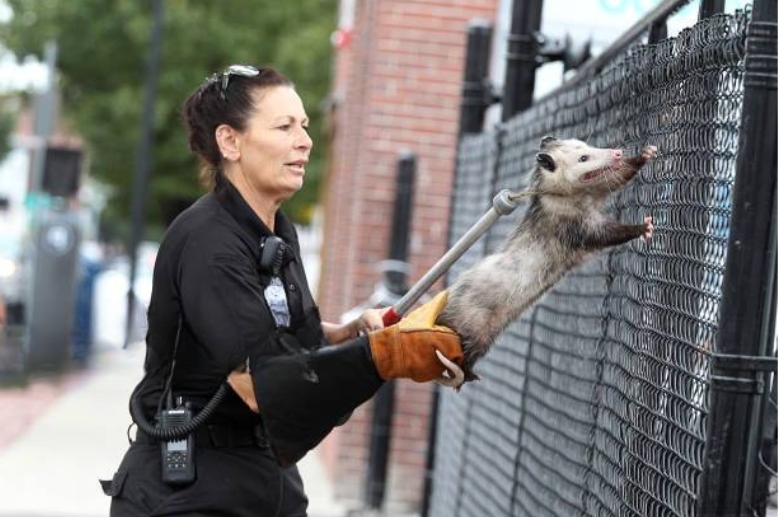
Your state fish & game department and municipal animal control department are go-to resources. They can lend humane cage traps and advise whether you may legally transport the possum elsewhere after being captured. If relocation is prohibited, they will humanely euthanize the possum.
Use extreme caution if hiring private wildlife control companies. Ensure they follow all applicable laws in your area and use ethical trapping and release protocols.
Bait and Trap
Baiting them into a humane cage trap is an effective and safe DIY method for capturing possums. This allows the possum to be transported away from the garage and released without direct physical interaction.
- Types of Traps: Use a sturdy metal cage trap designed for medium-sized animals, at least 32″ x 12″ x 12″. Baited cage traps are available for rent or purchase at animal & pest control stores.
- Bait Options: Effective baits include cat/dog food, fruit, vanilla wafers, peanut butter, and marshmallows. Place the appealing food in the back of the trap to lure the possum inside.
- Trap Placement: Identify areas with the most frequent possum activity. Ideal locations are along walls or corners near its nest or food sources. Ensure the trap is on a flat, stable surface.
- Safe Trapping Techniques: Use thick gloves when handling the trap to prevent bites. Bring a flashlight to see the trap clearly from a distance at night. Exercise caution upon approach as trapped animals may lunge.
- Humane Release: Drive at least 5 miles away to a suitable habitat before releasing. Avoid areas with roads or other possum territories. Ideal times are dusk or dawn when possums begin/end their activity.
Connect With A Garage Expert
Connect with local experts, Compare quotes, Get the best price.
Loud Noises
Possums startle easily due to their delicate hearing. Exposing them suddenly to loud sounds often causes the possum to flee whatever shelter they have taken up in search of quieter environs. Tactics to try:
- Play talk radio, metal music, or other jarring sounds on high-volume speakers pointed toward nesting areas.
- Sound sharp air horns or other noise-making devices intermittently. Possums may run out.
- Bang loudly on trash can lids or use other objects to create cacophonies of sound to drive the possum away.
Strong Odor
The extreme sensitivity of possum smell receptors also causes aversion to pungent, unpleasant odors. Natural scents to employ:
- Soak cotton balls in white vinegar or pureed garlic and place balls throughout the garage interior. The acidic, poignant smell repels possums.
- Dilute one tablespoon of ammonia in one gallon of water. Use this mild ammonia solution to wipe down garage walls and support beams near the nesting area. Let air dry completely so fumes dissipate. Never mix ammonia with bleach solutions due to toxicity. Use it with great discretion.
Illuminate the Garage

As nocturnal creatures are highly sensitive to light, flooding the garage interior with bright illumination overnight will encourage possums to abandon nests and exit.
- Install powerful shop lights oriented on all interior walls, under workbenches, or pointing toward backyard access holes.
- Use motion-detecting flood lights outside all external garage doors to startle and expose possums leaving at night.
- Keep lights on overnight to flood previously dark areas possums find attractive.
- Install outdoor spotlights aimed at external garage doors to startle exiting possums.
- Make the environment uncomfortable with constant brightness so possums vacate.
Homemade Scare Tactics
Sometimes, simple household items can be deployed creatively to frighten away possums seeking shelter in your garage.
- Set up mirrors, foil pans, or CDs to reflect light and startle them.
- Play recordings of aggressive possum sounds or dog/coyote noises.
- Use fake spiders, snakes, and Halloween decorations to alarm them.
- Remove any fruit, pet food, compost, or trash that initially attracted hungry possums.
Spray It With Water
- Connect a hose to a motion-activated sprinkler pointed at known possum access routes.
- When entering or leaving, the startling spray of water will soak possums.
- Install sprinkler heads above garage doors on timers to periodically spray the interior space overnight.
- Repeat water applications whenever new possum activities arise.
- Thorough wettings interrupt the scent marking and nesting behaviors possums rely on.
Connect With A Garage Expert
Connect with local experts, Compare quotes, Get the best price.
How to Keep Possums Out of Your Garage?
Getting rid of possums might be a challenge, but once they’re out, you want to keep them out. Here’s how.
1. Cover Holes and Possible Entrances
Thoroughly inspect garage walls and foundations for any openings, no matter how small. Use a flashlight to illuminate all problem spots. Begin sealing by stuffing holes with copper mesh, steel wool, or caulking. For more significant gaps, cut pieces of hardware cloth, window screen, or sheet metal to size.
Secure the patches firmly with liquid nail construction adhesive applied around all edges. For extra security, drive galvanized roofing nails through the center of patches every few inches.
Check areas like dryer vents, eaves, or where cables enter. Lastly, aim bright floodlights at pet or garage doors to discourage nighttime entries.
2. Safely Stash Away Food Sources
Discard all ripped bags of pet kibble possums accessed previously. Keep the remaining and new bags zip-sealed in Rubbermaid totes or tightly lidded metal garbage cans with latches. For wildlife-proof yet accessible storage, install galvanized garbage cans on elevated shelving units.
Attach sturdy carabiners, bungee cords, or ropes to lash cans securely in place. Bring cats and dogs inside overnight. Pick all ripe or rotting fruit religiously from trees or gardens right against garage walls. Remove fallen produce daily. Prevention requires eliminating food attractants possums will nose out.
3. Use Proper Waste Management
Designate one or two days each week to empty all garage waste receptacles into your central household collection bins. Use the city municipal waste pickup schedule as a reminder, taking cans curbside the night before.
Clean emptied trash cans and recycling tubs using gloves and diluted bleach solution. Scrub gently but thoroughly before rinsing.
Look for lingering drips of oils or food remnants to wipe up under workbenches, near motors, or behind storage items. Tidy operations limit possum attraction.
4. Clear Shelter Areas
Walk perimeter walls with floodlights held at possum height ranges, from ground level up to 5 feet high, while inspecting for potential dens or hiding spots. Seal crannies behind machinery, under shelves, or in deep corners with copper mesh.
Relocate stacks of older cardboard boxes to a centrally located and regularly accessed area rather than leaning them against walls. For extra protection, install inexpensive battery-powered motion detector spotlights that suddenly illuminate if possums approach these backup den sites.
5. Using Scent Deterrents
Mix two cups vinegar and 20 drops of eucalyptus, lemon, or peppermint oil into a spray bottle filled with water. Shake vigorously before lightly misting garage perimeter walls from ceiling to floor, concentrating on potential access points and previous shelter sites.
The natural acidic vinegar smell and essential oils create a potent possum repellent. Reapply weekly. Alternately, soak cloth rags in ammonia and place them in foil baking trays. Position at least three trays around the garage, replacing the scent every few days as it dissipates.
Connect With A Garage Expert
Connect with local experts, Compare quotes, Get the best price.
When Should You Call Animal Control?
It is often possible to successfully remove possums from garages using the gentle harassment and exclusion tactics detailed in this guide. However, regulations differ from state to state regarding acceptable possum deterrents, handling methods, relocation parameters, and what defines humane euthanization.
The standard procedure is having animal control officers assess the property and possum behaviors. They determine necessary action plans compliant with statutes. Typically, they humanely trap possums and relocate healthy adults at least 10 miles away or euthanize very sick animals. Let trained experts handle higher-risk scenarios.
Final Verdict
This guide has provided humane tactics for removing possums from garages, from simple tricks to professional removal. But safety is paramount when attempting self-directed eviction. Risks of disease, injuries, or legal violations escalate without proper precautions. While non-lethal control methods can successfully remove possums, you must weigh personal risks and know when to call experts.
Ready to reclaim your garage from unwanted guests? Take action now and safely remove the possum from your space with our practical and humane solutions!

